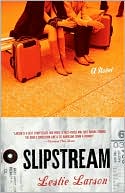Slipstream
by Leslie Larson
Shaye Areheart Books. 324 pages, $14. (paper)
LESLIE LARSON’S debut novel, Slipstream, captures with extraordinary vividness the ubiquitous anxieties of life in post-9/11 America. Almost none of Larson’s diverse cast of characters is free of the paranoia of our era—a flash of lightning is thought by each to be the explosion of a terrorist bomb, a scattering of baking powder is assumed to be anthrax. Tom Wylie, a bartender at a concession in the Los Angeles International Airport (LAX), the novel’s primary setting, voices the fear of all the characters: “You weren’t safe anywhere—not in McDonald’s, Safeway, your own house.” Their paranoia impacts their view of everything. When Rudy Cullen, a white aircraft-cabin maintenance supervisor, is fired from his job, he’s certain it’s because of his race. When Tom Wylie’s girlfriend gets pregnant, he assumes she did it on purpose to trap him into commitment. His niece, Jewell Wylie, suspects that her lover Celeste is preparing to leave her and return to a former woman partner Dana, the co-parent of their four-year-old adopted daughter. But as an old bumper sticker observed, even paranoids have real enemies: in Jewell’s case, her suspicion is warranted.
Slipstream is not a “GLBT” novel: most of Larson’s characters are heterosexual, though in Jewell she presents a thoughtfully drawn bisexual character who is weighed down by her obsessions and fears about her tenuous love relationship. Jewell is the daughter of Logan Wylie, one of the novel’s numerous losers, an ex-con who has fathered several children with a number of women and who seldom sees any of them. Jewell works in the cafeteria at UCLA to support herself as she studies architecture. Her professional aspiration suggests a trope for one who hopes to build, though everything around her seems to be falling down. Jewell is dismally unsuccessful in building a family with Celeste and Rachel, the adopted child. She feels painfully superfluous to the Celeste-Rachel-Dana family constellation and fiercely resents the frequent meetings between Celeste and Dana, presumably related to Rachel’s welfare. Jewell has great affection for the child (and at one low point entertains the idea of kidnapping her), but Rachel pinpoints Jewell’s fear that she has no place in their family by asking, “How come you’re living here with my Mimi?” Jewell’s immediate response betrays her own confusion: “Good question,” she replies, though she goes on to add uncertainly, “We love each other. … We want to be together.” Her hope that this assertion is true is constantly shaken: the four-year-old lets slip Dana’s hostile declaration that Jewell “will soon be gone”; Celeste spends hours with Dana while Jewell baby-sits Rachel; Jewell finds Celeste at Dana’s house with her cardigan misbuttoned, a confirmation for Jewell that the former lovers are at it again.
Celeste is much more sketchily drawn than Jewell. Her own obsession with family is emphasized comically through her excessive buying of Avon products for all her extended Argentinean Jewish relatives. What the reader knows about her primarily, however, is that she is the center of Jewell’s obsession. Even after she returns to living with Dana, the mere sight of Celeste continues to “knock [Jewell] into a kind of stupor.” In the midst of Jewell’s sorrows, longing for some comfort, she decides to reach out to Logan, her ne’er-do-well father, who’s on parole and about to run off to Mexico with an airline ticket he has just won in a raffle.
The dénouement of Slipstream brings all the major characters together for the first time, when Logan arranges to say goodbye to his brother and daughter at LAX, at the bar where Tom Wylie works. There, Jewell makes her sole genuine connection with her father, telling him of her anguished love for another woman and feeling “strangely at ease with him.” He gives her the only good advice she has ever gotten from him, that it’s “impossible to make someone love you if they don’t want to.” At this point, the action of the story rushes to a breathless conclusion that is all-too-credible in the crazy post-9/11 milieu. [Spoiler alert:] Rudy Cullen, the fired aircraft-cabin maintenance supervisor, who has been perpetrating deranged, vindictive hoaxes throughout the novel, has now strapped road flares (which look like dynamite) to himself and threatens to blow himself up in the LAX pavilion near Tom’s bar. The police and the military quickly descend on him. A young soldier, spooked by the clatter of an overturned bar stool, fires into the bar, and Logan is killed.
The few moments of understanding between Logan and Jewell, followed by the shock of his death, bring Jewell a clarity that is perhaps too sudden considering the extreme intensity of her former obsession. She now understands that, while she’ll never stop loving Celeste, their relationship is over. Indeed, she realizes, “her love didn’t have all that much to do with Celeste anyway. It was more her own stuff, all her own stuff.” She concludes in this happy, though not totally believable, epiphany, “Life would go on,” and she envisions herself finishing school and some day “lov[ing]someone else, and they might love her in return.”
____________________________________________________________________
Lillian Faderman’s latest book (with Stuart Timmons) is Gay L.A.: A History of Sexual Outlaws, Power Politics, and Lipstick Lesbians.







